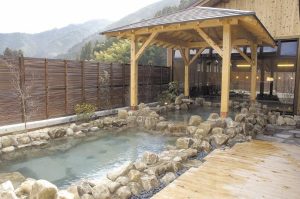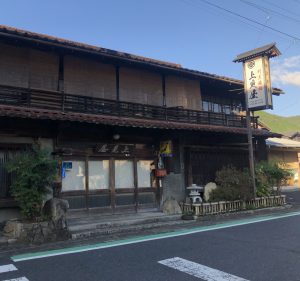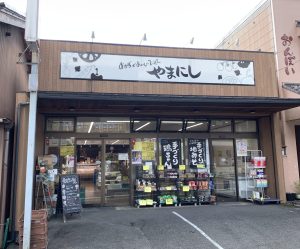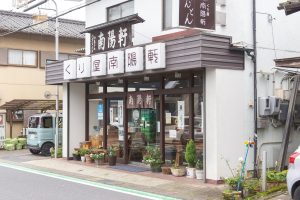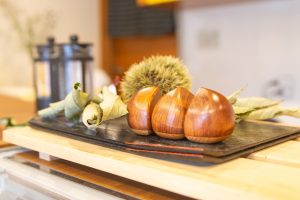日本料理店とこわかは、創業明治8(1875)年の上見屋の隣に店を構えています。上見屋の6代目早川篤志さんが店主を務めます。
「お座敷に入るっていうのにちょっと煩わしさというか、抵抗があるっていうお客さんも、すっと入れるような形のつくりにしたかったというか。(上見屋との)棲み分けとしては、靴を脱いで、わざわざ御膳を用意して、膝を突き合わせて飲むっていう場を設けるよりも、もうちょっと気安く入れるようなスタイルにしたくて。出来立てのものを出したいっていうのが一つあったんですよね、僕の中で。」(早川篤志さん)
すぐ近くに工場をもつ杣工房・早川泰輔事務所に依頼をし、平成25(2013)年に栗の木を使った新店舗をつくりました。中津川がもつ栗や栗きんとんのイメージを大事にしながら、地元の木材を使った建物にしたいという想いがあったそう。また、一人一人に出来立ての料理を提供したいという想いから、あえて小規模なお店のつくりにしています。
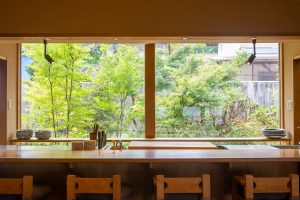
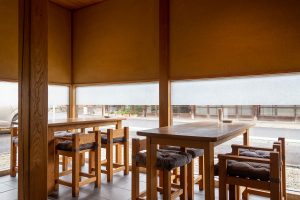
店名のとこわかは、常若と書き、「いつまでも瑞々しいこと、若々しいこと」を意味します。常若の精神を表す代表的なものが、二十年に一度社殿と神殿を新調する伊勢神宮の式年遷宮です。そして付知の森は、この式年遷宮と深いつながりがあるのです。
一回の遷宮において使われるヒノキの本数は一万本にも及びますが、そのためのヒノキの確保・育成を目的とした森林は、江戸時代には御杣山、明治時代から戦前は神宮備林と呼ばれました。付知を含む裏木曽の森林の一部は、江戸時代に御杣山に指定されて以来、伊勢神宮に良質なヒノキを供給し続けてきています。
「遷宮の時期に偶々テレビを見ていたときに、付知の森みたいなところから日が差して、キラキラってすごく綺麗な景色だった。そこに常若ってパッと出て、綺麗な名前だなって。漢字でそのまま書くと読んでもらえないので、ひらがなにしたんですけど。だから自分自身とか、この店の考え方もそうありたいというか、常若の精神でいたいなという意味を持ってつけたんです。」(早川篤志さん)
明治初期から続く上見屋の6代目でありながら、奥様の由美子さんとお二人で「自分たちの挑戦」として始めたのがとこわかです。
「僕はどっちかというとシンプルな料理が好きなので。あんまり原型がなくなっちゃうみたいな料理は好きじゃなくて、最低限の手を加えた、素材重視の料理というか。ストレート、直球ど真ん中みたいな料理が好きなので、それを目指しているんです。」(早川篤志さん)
御嶽水系の綺麗な水と地元のお米を釜で炊いたご飯は、それだけでも十分なほどしみじみとした美味しさ。また、こだわりの器で出てくるお料理は目にも鮮やかです。栗の木を使った居心地の良い店内で、美しい料理の数々をお楽しみください。

Japanese Cuisine Tokowaka
Japanese restaurant Tokowaka is located next to Agemiya, which was founded in 1875. Atsushi Hayakawa the 6th generation owner of Agemiya, is the owner.
“We wanted to create a space where customers who are uncomfortable with the idea of entering a tatami room could easily come in and enjoy themselves. I wanted to create a style that would be easy to enter, rather than having customers take off their shoes, prepare a set meal, and then sit down to have a drink. I wanted to serve freshly prepared food.” (Atsushi Hayakawa)
In 2013, He commissioned “Soma Koubou Taisuke Hayakawa Office”, which has a factory nearby, to build a new store using chestnut trees. He wanted to use local wood in the building while respecting the image of Nakatsugawa City , famous for chestnuts and mashed chestnuts(Kurikinton). He have intentionally made the restaurant small in order to serve freshly prepared food to each and every customer.
The name of our restaurant, Tokowaka means ” ever fresh and youthful“. A representative example of the spirit of “ever-youthful” is the Shikinen Sengu, the ceremonial relocation of the Ise Jingu Shrine, where the shrine main sanctuary is renewed once every 20 years. The forest of Tsukechi has a deep connection with this ceremony.
The forests used to secure and cultivate the 10,000 cypress trees used for the shrine relocation were called Misomayama in the Edo period (1603-1867) and Jingu-birin in the Meiji period (1868-1912) and before World War II (1868-1945). A part of the forests in Urakiso, including Tsukechi, was designated as Misomayama in the Edo period and has continued to supply high-quality cypress to Ise Jingu Shrine ever since.
“I happened to be watching TV during the shrine relocation period, and I saw the sun shining in a place like the Tsukechi Forest, and the scenery was sparklingly beautiful. The word “Tokowaka(常若)” popped up on that TV screen and I thought, “That’s a beautiful name. If I wrote it in kanji, people would not be able to read it, so I changed it to hiragana. I chose this name to the restaurant with the meaning that I want myself and the restarurant to be like the spirit of Tokowaka.” (Atsushi Hayakawa)
Although he is the sixth generation of Agemiya, which has been in business since the early Meiji period, he and his wife, Yumiko, started Tokowaka as a “challenge to themselves.
“I prefer simple dishes. I don’t like dishes that seem to lose their original form. I like dishes that focus on the ingredients, with minimal modifications. I like dishes that are straightforward and straight to the point, so that’s what I’m aiming for.” (Atsushi Hayakawa)
The local rice cooked in a kettle with clean water from the Ontake mountain water system is so delicious and just enough to make you feel full. In addition, the dishes that come out of the discerning tableware are dazzling for the eyes. Please enjoy the beautiful dishes in the cozy restaurant made of chestnut wood.

